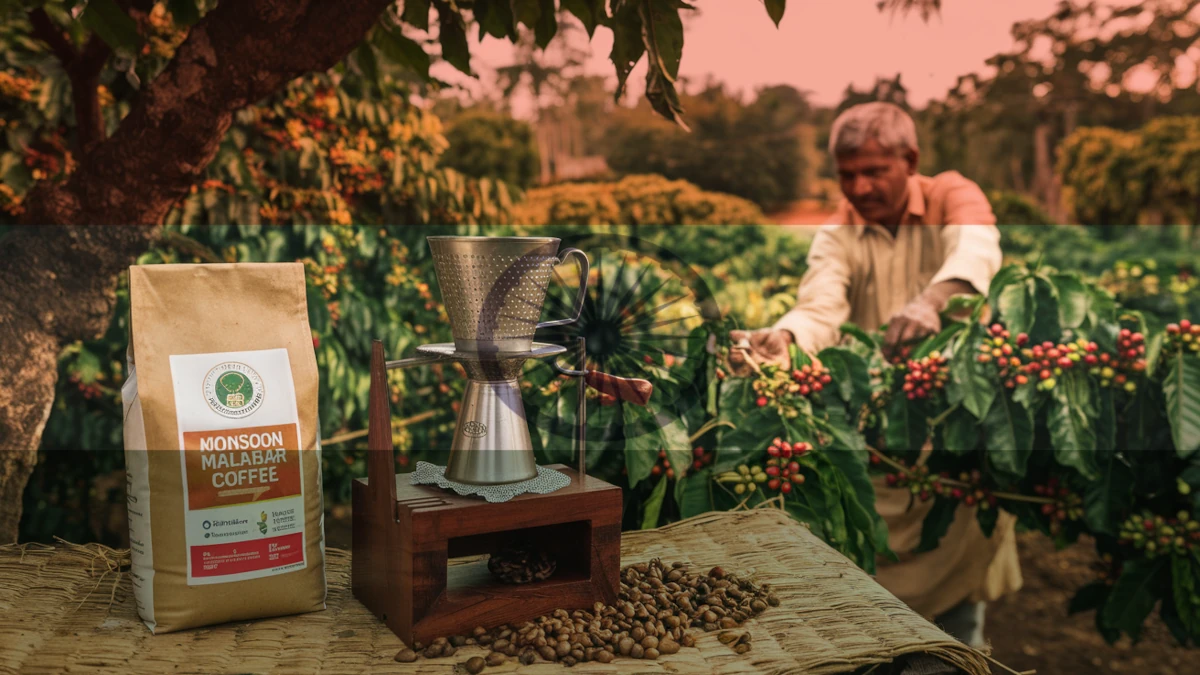Indian coffee holds a special place in the global coffee scene with its bold flavors, rich history, and distinct growing methods. From the legendary tale of Baba Budan to the celebrated Monsoon Malabar coffee, India has carved its niche among coffee enthusiasts worldwide.
Indian coffee offers a unique blend of bold flavors, historical roots, and innovative growing methods, making it a favorite among coffee enthusiasts worldwide.
In this article, we’ll explore the origins, prominent regions, processing methods, and traditional brewing practices that make Indian coffee stand out.
By the end, you’ll discover why Indian coffee stands out globally and how each cup reflects India’s heritage and craftsmanship.
Table of Contents
The Origins of Indian Coffee
The Legend of Baba Budan
The story of Indian coffee begins in 1670 when the Sufi saint Baba Budan smuggled seven coffee seeds from Yemen during his pilgrimage. He planted these seeds in Chikmagalur, Karnataka, transforming the region into the birthplace of Indian coffee.
Colonial Influence and Growth
During British colonial rule, coffee cultivation expanded rapidly across southern India. Despite facing challenges like leaf rust, farmers recovered by developing rust-resistant coffee varieties.
Rise of India’s Coffee Industry
In 1942, the Coffee Board of India was established to support coffee farmers and regulate production. Today, India produces over 5 million bags of coffee annually, with 80% of it exported. The domestic market is also growing, particularly with the love for Indian filter coffee.
Unique Growing Practices of Indian Coffee
Shade-Grown Coffee
Indian coffee is primarily shade-grown under the canopy of trees, often intercropped with spices like pepper, cardamom, and vanilla.
Benefits of shade-grown coffee:
- Enriches the soil naturally.
- Enhances biodiversity.
- Creates unique flavor profiles.
Indian Coffee Processing Methods
India uses three primary processing techniques:
- Washed (Plantation Coffee): Produces clean, well-balanced flavors.
- Natural (Cherry Coffee): Beans are sun-dried for bolder, sweeter flavors.
- Monsooned: The famous Monsoon Malabar coffee undergoes moisture exposure during monsoon winds, resulting in earthy, bold flavors.
Prominent Indian Coffee Growing Regions
Karnataka – The Coffee Capital of India
- Chikmagalur: Balanced Arabica beans with smooth body and mild acidity.
- Coorg (Kodagu): Nutty, full-bodied Robusta coffee, perfect for espresso.
- Bababudangiri: Spicy and fruity Arabica beans, named after Baba Budan.
Kerala – The Land of Robust Flavors
- Wayanad: Strong Robusta beans, ideal for espresso blends.
- Idukki: Smooth, organic Arabica and Robusta with a rich profile.
Tamil Nadu – The Blue Mountains and Beyond
- Nilgiris: Bright acidity and floral notes, offering a refreshing cup.
- Yercaud: High-elevation coffee with fruity undertones and balanced flavor.
Emerging Regions: Andhra Pradesh & Odisha
- Araku Valley: Produces organic, specialty coffee with chocolatey and fruity notes, thanks to the unique terroir of the region.
Traditional Indian Coffee Culture
Indian Filter Coffee
Indian filter coffee is a staple in South Indian households. It’s prepared using a mix of coffee and chicory, creating a strong, creamy brew served with milk and sugar.
Cultural Significance:
- A daily ritual in many homes.
- Symbol of hospitality and tradition.
The Role of Coffee Houses
Modern coffee houses are reshaping India’s coffee culture. Inspired by global trends, urban consumers are now embracing artisanal and specialty coffee, fostering a growing appreciation for India’s coffee heritage.
Monsoon Malabar Coffee: A Unique Flavor Journey
The Monsooning Process
During the monsooning process, beans are exposed to humid monsoon winds, absorbing moisture and expanding in size. This process reduces acidity and gives the beans their signature bold, earthy flavor.
Flavor Profile
Monsoon Malabar coffee is known for its:
- Earthy and wild flavors.
- Low acidity and smooth finish.
Why Coffee Enthusiasts Love It
The unique taste of Monsoon Malabar makes it a sought-after coffee in specialty blends, appealing to those who love bold, intense coffee.
Challenges in Indian Coffee Production
Small-Scale Farming
With 98% of coffee farmers being small-scale growers, challenges include:
- Limited resources for traceability and quality control.
- Difficulty scaling production for global demand.
Grading System
Indian coffee is graded based on processing methods and bean size:
- Plantation: Washed Arabica.
- Cherry: Naturally processed coffee.
- Parchment: Washed Robusta.
Beans are also classified by size, such as AAA (largest) and PB (peaberry).
Why Indian Coffee Stands Out Globally
Unique Terroir and Biodiversity
India’s diverse landscapes, high altitudes, and shade-growing methods contribute to the coffee’s distinctive flavors and profiles.
Sustainability and Organic Practices
Many Indian growers adopt eco-friendly farming techniques, focusing on sustainability and organic production.
Recognition in Specialty Coffee Markets
Indian coffee, especially varieties like Monsoon Malabar and organic Araku Valley coffee, is gaining recognition in global competitions and specialty coffee markets.
Conclusion
From the legend of Baba Budan to the unique Monsoon Malabar coffee, India’s coffee heritage is a blend of tradition, innovation, and dedication.
Each cup of Indian coffee tells a story of rich history, diverse regions, and distinct flavors. Whether it’s the bold Monsoon Malabar or the creamy comfort of Indian filter coffee, Indian coffee promises a unique experience for coffee enthusiasts worldwide.
Discover the unmatched richness of Indian coffee and savor a journey through bold flavors, timeless traditions, and artisanal craftsmanship.
